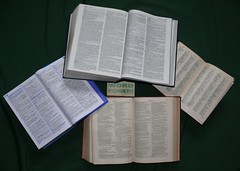 |
| Image via Wikipedia |
Is yeast poisonous? Is it toxic? Not usually, but it is, by God's standards, a contaminant. Unleavened bread is made without yeast, and that is what God required in the Passover meal and for sacrifices at the Temple. In Leviticus 6 the grain and meal offerings were made with fine flour and oil but without yeast.
In the offering, God required purity. He calls us to be pure, too. He calls Christians to be righteous. Jesus restated the Ten Commandments and made reference to our service as being more righteous than that of the Pharisees because he expected it to come from the heart and address the meaning of the Law not just the letter. There is an obscure indication that God knew that in the Old Testament too. In Leviticus 7:13 he gave instructions about the fellowship offering.
Along with his fellowship offering of thanksgiving he is to present an offering with cakes of bread made with yeast.
God never changes his standards, but he accepts our imperfections knowing that Christ's Blood is the remedy. No amount of sacrifice or unleavened bread or blood of goats and sheep will suffice. Only Jesus can make us acceptable and he knows that. He wants us to know that we can't do it without him, and he never wants us to hesitate to come to him because of our sin or failure.
He loves us even in our natural state, and he accepts offerings of bread made with yeast.


